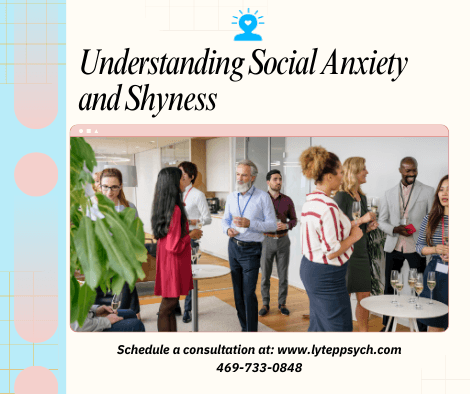Wed Mar 12 2025
Social Anxiety vs. Shyness: What’s the Difference? at Lyte Psychiatry, Best Psychiatrist and Therapist Near You (Affordable Adults and Adolescents Therapist and Psychiatrist Near You) Dallas, TX.

Social Anxiety vs. Shyness: What’s the Difference? at Lyte Psychiatry, Best Psychiatrist and Therapist Near You (Affordable Adults and Adolescents Therapist and Psychiatrist Near You) Dallas, TX
Ever felt butterflies in your stomach when you meet new people or have to speak up in a group? That flutter of nervousness is common, but how do you know if it’s just a bit of shyness or something more intense like social anxiety? Understanding the difference can help you or someone you care about find the right tools to feel more at ease in social settings.
1. Understanding Shyness
Brief, Mild Discomfort: Shyness is a personality trait characterized by feeling uncomfortable or timid in social situations—especially unfamiliar ones. These jitters typically ease up once you settle into the environment.
Situational and Temporary: Shyness often fades once you’ve had a chance to warm up. You might feel nervous before giving a presentation or meeting new people, but the discomfort generally decreases as you become more familiar with the situation.
Minimal Impact on Daily Life: While shyness can be a hurdle, it usually doesn’t derail your ability to function at work, school, or in personal relationships. You might feel awkward at first, but can adapt once you get used to the setting or people around you.
2. Spotting Social Anxiety
Persistent, Intense Fear: Social anxiety goes beyond feeling a little uneasy. It’s a deep-seated fear of being judged, embarrassed, or humiliated in social settings. This fear can linger and worsen over time, especially if left unaddressed.
Physical and Emotional Symptoms: People with social anxiety might experience rapid heartbeats, excessive sweating, or shaky hands, along with racing thoughts and self-criticism. These symptoms can start days (or even weeks) before an event.
Significant Impact on Daily Activities: Social anxiety can hinder relationships, academic performance, or career progress. Some people avoid social gatherings altogether—possibly missing out on professional opportunities or meaningful connections.
3. How to Tell the Difference to Your Psychiatrist
Intensity of Discomfort
Duration of Symptoms
Effect on Daily Life
5. Practical Tips for Overcoming Social Anxiety
Mindful Breathing Take slow, deep breaths when nerves strike. Inhale for four counts, hold for four, and exhale for four. This helps calm your mind and body.
Gradual Exposure Ease into social situations that trigger anxiety. Start small—like a quick conversation with a coworker—then build up to larger gatherings.
Positive Self-Talk Remind yourself of past successes. Instead of focusing on “What if I embarrass myself?” think, “I’ve handled challenging situations before. I can do it again.”
Set Realistic Goals You don’t have to conquer every social fear at once. Aim for small achievements, like introducing yourself in a meeting or sending a message to a new acquaintance.
Seek Professional Support Counseling or therapy can be instrumental in identifying triggers and developing strategies to manage them. At Lyte Psychiatry, we offer a welcoming environment to explore and overcome social anxiety step by step.
Seek Professional Help Near you at Lyte Psychiatry (Best Adults and Asolescents Therapist and Psychiatrist Near You)
At Lyte Psychiatry in Dallas, TX, our compassionate team specializes in treating both adults and adolescents experiencing social anxiety or other mental health challenges. We understand that everyone’s journey is unique, which is why we tailor our treatment plans to fit your specific needs. Through therapy, medication management (when needed), and practical coping strategies, we aim to help you build the confidence to navigate social situations more comfortably.
To Schedule an appointment. Click Here
To see our services. Click Here
Call us if you have questions at 469-733-0848
FAQ: Your Questions Answered
Q: Isn’t social anxiety just another term for shyness?
A: Not exactly. While both involve feeling nervous around people, social anxiety is more intense and persistent. It often leads to avoidance of social situations and has a greater impact on daily life.
Q: Can teenagers have social anxiety, or are they just going through a phase?
A: Teenagers can absolutely experience social anxiety. If these fears are severe, long-lasting, and affect their academics or relationships, it’s more than just a phase.
Q: How can therapy help with social anxiety?
A: Therapy provides a safe space to identify what triggers your anxiety and equips you with coping techniques. Approaches like Cognitive Behavioral Therapy (CBT) can help you reframe negative thoughts and gradually face fears.
Q: Will I need medication for social anxiety?
A: Medication isn’t a one-size-fits-all solution. Some people benefit from it alongside therapy, while others find success with therapy alone. At Lyte Psychiatry, we’ll collaborate with you to determine the best treatment plan.
Q: Does social anxiety ever go away on its own?
A: It may lessen over time, but if it’s significantly interfering with your life, professional help is advisable. Early intervention can prevent the anxiety from worsening.
Q: Is Lyte Psychiatry affordable if I’m on a tight budget?
A: Yes. We offer flexible payment options and accept various insurance plans to ensure that high-quality mental health care is within reach for both adults and adolescents.